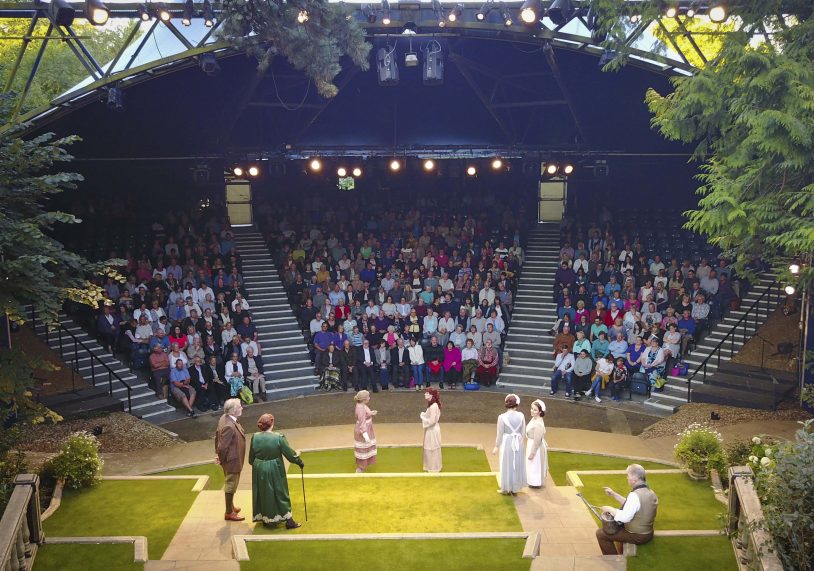
A Bard Influence…
Welcome back! That’s the message of Stamford Shakespeare Company which is delighted to announce that this summer will see the resumption of productions at the open air theatre near Stamford… all’s well that ends well? Not quite, says Chairman Caroline Stephenson…

All The World’s A Stage, but nowhere more so than Tolethorpe Hall. This year, the open-air theatre company’s 600-seater auditorium may seem a little less crowded, but happily, Stamford Shakespeare Company will prove the old adage that the show must go on, as it returns to the area’s calendar of events, albeit with the continuation of some restrictions.
The place would already be one of beauty simply as a private residence, but the fact that it’s home not to a family, but to an experience we reckon is the finest open air theatre in the country makes Tolethorpe even more precious; a theatre of which locals are justly proud. There remains, however, a problem. The pandemic has hit all theatres and arts centres hard, but Tolethorpe – by virtue of its seasonality, its uniqueness and its lack of other revenue streams – was more vulnerable than most.
“What a time to be a chairman,” says Caroline Stephenson with a shudder in her voice. Heading up Stamford Shakespeare Company’s board of directors, she’s of course not averse to a bit of drama, but 2020 was a bit too dramatic, even for her and the 10-strong board.
“In my previous life I worked for the BBC and moved to the area for a better lifestyle when I had a young family. I began working as a drama teacher at my children’s school, Witham Hall, near Bourne and I joined the Stamford Shakespeare Company in 2001, when the company’s founder Jean Harley was still playing an active part in creating productions.”
“I performed in eight plays; including Helena in A Midsummer Night’s Dream, as Viola in Twelfth Night and as the eponymous Katherina in The Taming of the Shrew. In 2009 I was asked by Jean herself to direct A Midsummer Night’s Dream and made my directorial debut for the company.”
“Jean was an inspiration and I have so much respect for her. She was so driven and everything I’ve done as part of the theatre since has been with Jean in the back of my mind, determined – like everyone here – to honour her professional standards and her belief in creating a really special experience for our audiences.”
So, was the Stamford Shakespeare Company and Tolethorpe Hall going to suffer the slings and arrows of outrageous Covid on Caroline’s watch? Not a chance. This act in the theatre’s history would never be a comedy, but at least it wouldn’t turn into a tragedy. Taking arms against a sea of troubles for performing arts, she and her team were determined to ensure the theatre’s survival.
“I’d been chairman in 2019 which was comparatively plain sailing,” she recalls. “I was re-elected in 2020 and Boris, on 16th March, advised the public not to go to theatres. It was an unenviable decision for him, and nobody disputed the necessity of that decision, but it remained a devastating blow to the industry, awful.”
“Each production at Tolethorpe is a year in the making. We begin to think about what plays we will host for the following year even as the current productions are being performed. Scripts are prepared in the late summer, auditions are held in October, read-throughs begin in December and rehearsals begin properly in January. Naturally, as that’s all happening, costumes, sets and other preparations are all underway too.”
“And so, with news of the lockdown coming in March, productions were already underway, and furthermore, 11,000 tickets – about a third of our total annual ticket sales – had already been sold for the three 2020 productions. We made the awful decision to close down the theatre and furloughed our full-time staff.”
Despite its suspension of productions, a number of Tolethorpe Hall’s overheads remained. Anyone with a listed property or even a modestly-sized estate can relate to the travails of maintaining a Grade II* listed 19th century property, set in seven acres.
With the impossibility of raising any income through ticket sales that year, Caroline and the board announced the launch of the company’s Save Your Theatre appeal in August and made public the shortfall figure of £240,000 that Covid was costing Stamford Shakespeare Company, admitting that without support the future for the theatre was grim. The announcement was a clarion call and a huge number of people were quick to aid the theatre.
“From that terrible declaration everyone joined in efforts to help mitigate the shortfall,” says Caroline. “From donations, to revenue from car boot sales, and the sale of kitchen garden produce to the many people who allowed us to keep their ticket revenue irrespective of the postponement of the shows. The support we received was absolutely overwhelming. We were truly touched and it’s no exaggeration to say that the love and affection that people showed the theatre has secured it for the future.”
“Within two or three weeks of the appeal we had tens of thousands of pounds, the majority of the beneficiaries of the Government’s Cultural Recovery Funds were announced.”
“In October, we were one of the 1,385 venues to be awarded a share of the £1.57bn funding, receiving the £240,000 figure which represented the equivalent of 20,000 tickets.”
Happily though, just prior to an official announcement last month, Pride Magazine was made aware – albeit under embargo – of news that the theatre’s 2021 productions, which were postponed last year, will go ahead this summer and tickets are on sale now. All’s well that ends well, then? Unfortunately, no.
“The capacity for the auditorium is 600 and though we’re relieved to be opening again for our 2021 season, there remains in place a number of conditions that we need to adhere to in order to keep our audiences safe,” says Caroline.
“With a requirement towards social distancing we’re limited to audiences of about 250 per performance, and we can’t hold any additional performances to make up the shortfall from what would ordinarily be a total annual audience in excess of 34,000 people. That’s because the three annual plays run over four weeks each, continuously, and because cast and crew are almost entirely unpaid volunteers with day jobs and commitments beyond the productions.”
“That means although we’ll be able to put on three productions this year our audience numbers and our ticket revenues will remain lower than usual and the knock-on effect from Covid will continue into 2022. Things are looking more positive, but we’re not out of the woods yet.”
It’s a cautious note, and the whole team remains truly delighted to be able to bring two of their three productions back for the summer, but the third play – Shakespeare’s most famous – did need a rethink.
“Each year we aim to present two of Shakespeare’s plays plus a wildcard – usually a comedy or a family performance with broader appeal – and in 2020 we were due to present Love’s Labour’s Lost. Rehearsals for that performance were already underway and we’re delighted that will still go ahead. Our wildcard play for the year was Oscar Wilde’s The Importance of Being Earnest, preparations for which were also underway. Happily, for each of those productions we have managed to retain most of our cast and crew.”
“However, we were also due to present Romeo & Juliet. Star-cross’d lovers who are madly in love, but have to socially distance during their courtship, would look a little odd, to say nothing of the fact that the production also involved sword-fighting; impossible to rehearse or perform with social distancing in place too.”
“I spent most of the Christmas holidays reading plays and came across Humble Boy, written by Charlotte Jones, which was first performed at the National, rather later in the day than many of our other productions, in 2001.”
Though this be madness, yet there is method in it; it’s inspired by Hamlet so there’s a very loose connection to the theatre’s usual oeuvre, but it’s a comedy, rather than a tragedy which, let’s face it, is what we all need at the moment.
“It’s also set in the 1990s with the lead, Felix Humble, a Cambridge astrophysicist rather than a Danish Prince. The modern mise-en-scene made sets and costumes easier, and though it feels a bit more hurried than our usual year-long works, we’re confident that the creative decisions we’ve made will enable us to host a production with polish that we can be every bit as proud of.”
Stamford Shakespeare Company’s productions fall stubbornly and resolutely between amateur dramatics and professional theatre. For whilst it’s true that the company’s work is absolutely stellar in scale, quality and talent, it bears a reminder that none of the actors and very few of the crew for each performance are paid.
With just four full-time staff – and some freelance work on the part of costume designers like Miriam Spring Davies – over 100 people work hard to create three plays a year, and put on around 80 performances.
Each play itself has a cast of about 20 actors, but a team of up to 40 behind it, some working extra hard across multiple plays. An in-house costume department looks after a collection of 1,000 costumes and to create or modify about 200 a year for the three productions, ensuring they fit the cast beautifully and reflect the setting in which each production is based.
For instance, Love’s Labour’s Lost is set in the 17th century, but The Importance of Being Earnest requires a late-Victorian look. Previously the costume designers have been called upon to create dresses for 1920s flappers and 1940s spivs as well as their staple of codpieces and ruffs.
Behind the scenes – literally – are the set-builders, Nick Carlton and his team, who hand-build multiple sets measuring 30ft x 20ft. These weigh two and a half tonnes and have to be on wheels to facilitate quick production changeovers. They’re hand-painted and are designed to blend in with the leafy setting of Tolethorpe’s open-air amphitheatre.
Actors are required to put in around 500 hours during the course of a production, and maintain the company’s high standards – and its faithfulness to Shakespeare’s text, which in itself necessitates admirable studiousness.
It seems grossly disrespectful to suggest that the actors on the stage of Tolethorpe Hall are amateurs. Though it’s true that they’re not paid, their commitment to their production is unquestionable, and because of the high production values throughout the theatre, the company attracts a very good calibre of acting talent as a way of giving aspiring performers a way into professional theatre.
Let’s not forget, too, that Tolethorpe is one of the best opportunities for new talent to emerge, and has launched the careers of a fair few theatre professionals, courtesy of the Tolethorpe Youth Theatre group.
A RADA graduate, Jean Harley founded the company in 1968 and died in 2014 at the age of 91. Five years later, in 2019 Stamford Shakespeare Company sold its 1,000,000th ticket, something that she would have been proud to see.
Initially the theatre performed in the monastery gardens of The George of Stamford, before work on the buildings meant that in 1977 the hotel could no longer accommodate the theatre’s productions.
With just £78 in the bank, a private loan of £36,000 was necessary to enable the group to purchase the near-derelict Tolethorpe Hall and has been paid back long since. Once the dust settles from Covid, audiences in excess of 30,000 will enjoy the group’s productions.
Still Jean’s ethos is woven through the commitment of cast and crews at Tolethorpe Hall and still today the actors behind of each performance don’t take curtain calls, both because some volunteers whose contribution Jean deemed just as important would be omitted from the appearance, but also because she didn’t want to ruin the illusion in theatre of deceased characters coming back to life.
Theatre today has a real uniqueness. In an era of big-budget film, computers can be used to create any vista, landscape, any explosion or creature. Think about the lush, colourful landscape of James Cameron’s CGI film Avatar, or the weird and wonderful creatures of The Hobbit and Lord of the Rings, all made possible with technology like motion capture.
Theatre at Tolethorpe has none of this technology. No editing techniques or sound effects. Instead, the script is king and acting talent remains its queen. The story comes to the fore, always, and is never compromised or substituted by the introduction of technology and techniques.
“It’s a medium unlike others, and in an era when theatre has been technically surpassed by cinema and TV, theatre endures because of the purity and pleasure that its authenticity ensures,” says Caroline.
“We’d considered introducing streaming technology as used by some much larger productions both during and before the pandemic, but it’s just not the same. The atmosphere of the performance, the reaction of others around you to what’s happening on stage… that performance playing out in front of you in real time. It’s not something that can be replicated the way we want to on screen.”
Caroline is quite right; her directorial debut for the company was A Midsummer Night’s Dream in 2009, and the audience had failed to notice the little pond that had been created on the set until Helena rejects a frustrated Demetrius and pushes him into the water. I was there and witnessed the audience’s frisson of shock and giggles as it rippled gleefully across the auditorium.
It was just one in thousands of magical, hilarious, dramatic and wonderful moments of talent played out to audiences in the 53 years that the company has been around.
Supporting the group is as simple as purchasing tickets and enjoying a night out – something that you should do this season more than ever – but for £15, you can all also become a Friend of Stamford Shakespeare Company, offering priority booking two weeks prior to tickets being offered on general sale, plus free programmes for each year’s performances and bulletins with updates on events and other activities at Tolethorpe.
“We’re enormously grateful for all the support we’ve had from our public, and we’ve been shown great love by the Friends of Stamford Shakespeare Company and by those who have allowed us to retain their ticket revenue even when the productions were delayed,” says Caroline.
“We’d like to thank all of those people and to assure them of priority booking for future shows beginning with the 2021 season.”
“Across Tolethorpe the sun is shining, the grounds are looking super. Summer is coming, and so are our productions.”
“We’re delighted to be back and we have greater resolve than ever, so when it comes to celebrating the great British summer and enjoying a really lovely evening of entertainment, once again… the play’s the thing!”
Stamford Shakespeare Company, based at Tolethorpe Hall, will host Love’s Labour’s Lost, The Importance of Being Earnest and Humble Boy this summer from June to August. Ticket prices are from £14.50-£19.50, for dates and for more information on become one of the Friends of Stamford Shakespeare Company, see www.stamfordshakespeare.co.uk or book by calling Stamford Arts Centre on 01780 756133.






